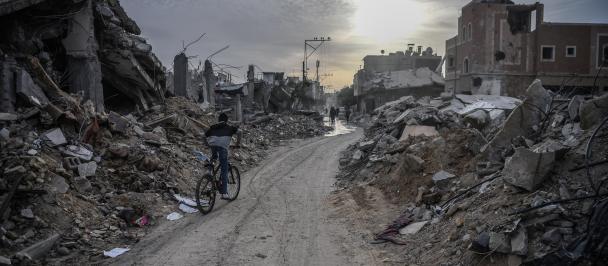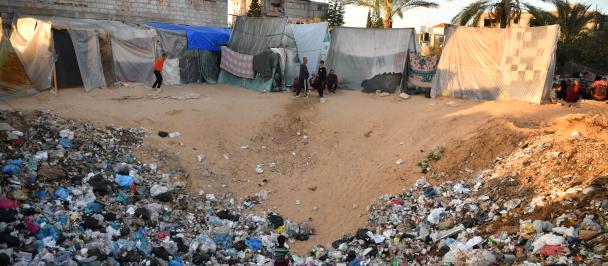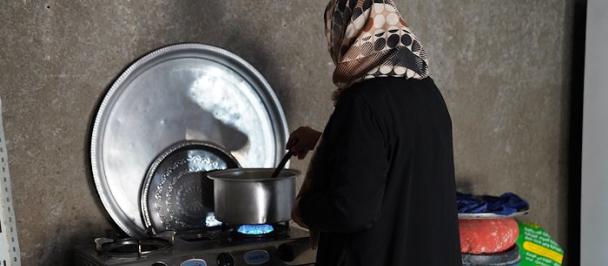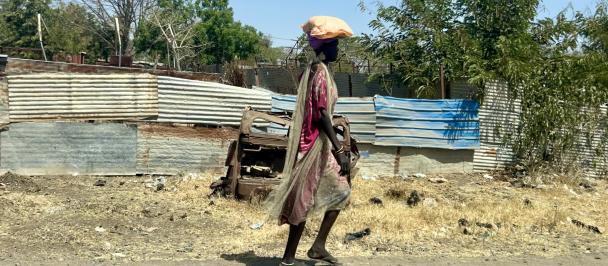Building resilience in disaster-prone Latin America and the Caribbean
Digital assessments to the rescue
May 7, 2024

In crisis situations, effective reconstruction and recovery efforts depend on reliable data on the damage and the needs of affected communities.
Between 1997 and 2017, 25 percent of all disasters in the world occurred in the region of Latin America and the Caribbean, affecting 277 million people. Over 90 percent of them were affected by climatic events such as storms and floods. The rising number and recurrence of extreme weather events, prolonged droughts, coastal erosion, floods and landslides is increasingly becoming an everyday reality for populations in Latin American and the Caribbean.
In crisis situations, there is a need for real-time data on the impact and needs of communities to guide effective response, recovery and reconstruction efforts. Through the Digital Assessments team, UNDP supports Country Offices globally in collecting data that captures valuable information about damage and socio-economic impact on the ground, no matter the type of crisis—conflict, disaster, climate risks, or social and economic shocks. By employing digital tools and methodologies, these post-crisis assessments provide clarity and insights important for making timely policy decisions that leave no one behind.
Role of data in resilient reconstruction
After the devastating impact of Hurricane Fiona that brought 150 km/h winds and rainfall into the Dominican Republic in 2022, a Household and Building Damage Assessment (HBDA) was conducted. Based on the data collected on needs and local vulnerabilities, UNDP was able to provide targeted housing and business support in 2023 to more than 200 affected people in Sabana de la Mar, the hardest hit town. The results of the HBDA have informed the remarkable progress made towards community recovery and resilient reconstruction.

In the aftermath of Hurricane Fiona in the Dominican Republic, a digital-supported damage assessment helped to inform efforts towards resilient reconstruction.
“[My roof] had little palm boards. It was already old and leaking, and I had a plastic sheet on top of it. I was going to stay in the street, that’s what I thought, because I had nowhere to take shelter,” Sabana de la Mar resident Victor recalled. “I was very happy when they told me that they were going to build [a house] for me, and when they came to build it, I was overjoyed. Overjoyed because I was going to have shelter.”
The homes and electrical systems of over 100 most vulnerable people in Sabana de la Mar were repaired. A special focus was placed on supporting female-headed households who tend to be disproportionately affected by disasters.
Data for targeted assistance
The findings of post-crisis assessments also play a crucial role in prioritizing resources and targeting support. A Socio-Economic Impact Assessment conducted in Belize in 2021 provided valuable information to help micro, small and medium-sized enterprises (MSMEs) recover from the effects of the global pandemic. The collected data helped identify a need for increased digital literacy, and in 2022 almost 300 MSMEs completed training on topics including technology, digital marketing and content development.

A socio-economic impact assessment provided valuable information to help micro, small and medium-sized enterprises in Belize recover from the effects of the COVID-19 pandemic.
This data also inspired the launch of a national MSME roadshow and the creation of a Virtual Knowledge Center, where MSMEs can access digital guides on using technology to respond to changes in the business environment. Additionally, to bridge the digital divide in the country, 14 Digital Connect Centers were created between late 2022 and early 2024, providing safe spaces, computers, and reliable internet. These strategically located Centers also host business development programmes, digital literacy training and digital bootcamps for Belizean youth in 14 relatively poor and largely rural communities.
“MSMEs are the life blood of our communities, and with [these] targeted programmes they will continue to boost economic recovery through job creation, poverty alleviation, and will help us achieve more equitable development,” highlighted Narda Garcia, Chief Executive Officer of the Ministry of Investment of Belize, at the inauguration of the national MSME roadshow.
Data for informed policy making
In 2023, the Digital Assessments team trained representatives of local and national Honduran institutions in San Pedro Sula to conduct an HBDA. The results of the assessment revealed the difficult circumstances faced by communities in flood and landslide-prone areas. The findings—including the overwhelming percentage of households living on meagre incomes and the high incidence of flooding during tropical storms—highlighted the urgent need for risk-aware municipal emergency plans.

In Honduras, UNDP's Digital Assessments team trained representatives of local and national institutions to conduct household and building damage assessments.
In a significant stride toward enhancing local governance and community resilience, a roadmap was developed to strengthen the emergency management and response capacities of the Association of Municipalities of Honduras. “First, the roadmap helps the Association with technical elements [on integrated disaster risk reduction] that can become tools for national use. And second, it serves the municipalities, so that they can know how to deal with emergency situations,” said Luis Castillo, technical coordinator of the Association. Leveraging the insights from the HBDA, the evidence-based emergency and contingency plans not only respond to immediate needs but also build resilience and enhance preparedness for future disasters.
Data-driven insights are key to uncovering challenges and designing measures that adequately support communities recovering from the impacts of crises. The stories from Belize, the Dominican Republic and Honduras underscore the transformative power of data in shaping recovery efforts and fostering resilient communities.
By leveraging digital tools and methodologies, the Digital Assessments team exemplifies how data can be harnessed to build resilience, inform targeted assistance, and guide policymakers with precise information to aid communities in need. As we navigate the increasing challenges posed by climate change, it is essential to remember the invaluable role of data in building a more resilient and inclusive future for all.

 Locations
Locations



